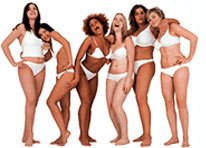Women with Clothes in Billboard Campaign!

Reports are reaching me that in the latest Dove campaign for real beauty the real women in the billboard campaign actually keep their clothes on. Now that is truly shocking and original!
This is definitely an improvement on the main campaign for real beauty which features six young women in their underwear. Using women in their underwear to sell products is a pretty old story. Unilever are attempting to promote this as a feminist campaign by saying that these are "real" women but Unilever are just the same old wolf but in sheeps clothing.
It is not essential to use half-dressed women to sell products. However within the advertising industry it has simply become the accepted thing to do. The female body is just another tool in the advertisers toolbox, just a commodity used to sell everything and anything.
If you object, then don't buy it!
Some excerpts from an article in the Sydney Morning Herald about Beauty focusing on the Dove Campaign for Real Beauty.
"Yes, these women are big and fleshy when compared with the anorectic adolescents usually trotted out to convince us to part with mega dollars for small pots of potion. But these confident, grinning women, with their perfect teeth and flawless skin, don't resemble those I see in my local shopping centre pushing trolleys. There isn't a wrinkle or a saggy behind on any of them.
What's more, and despite Dove's assertions to the contrary, these women are models. They were carefully culled from the crowd and paid to represent a product. Same as any other casting call. They're now celebrities, touring shopping centres and appearing on television in the United States - a marketing dream
Dove has acquired cachet, too, by hiring a prestigious place of higher learning to do its market research (more common than you'd think) and linking up with reputable women academics such as Orbach, Etcoff and Wolf. The last praised Dove at the Sydney Writers' Festival this year before admitting her proxy relationship with the company.In the end, even though Dove may ask some useful questions and may even do some good, its measure of beauty is still calibrated by thighs not thoughts, visage not values and appearances not actions.
Dove's definition is just as disempowering and confining as any other definition of idealised beauty.
Would Dove really be so concerned about my self-image if it weren't trying to get me to buy its products? Would the company still bankroll its social and educational programs, if sales declined?
If Unilever, which owns the Dove brand, was really committed to the body image issue, wouldn't it change the advertising (its worldwide media budget is $8.6 billion) for all its other beauty products: Pond's, Lux, Pears, Sunsilk and Rexona among them? Wouldn't it be concerned that it's the maker of Slim-Fast?
If this was anything more than the savvy implementation of a marketing angle, would the same company have given us LynxJet, the most sexist advertising of recent times?
Call me cynical, but I guess there must be real beauty in those dollars."


0 Comments:
Post a Comment
<< Home